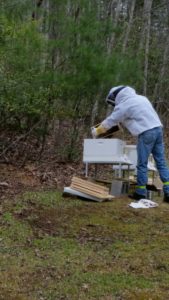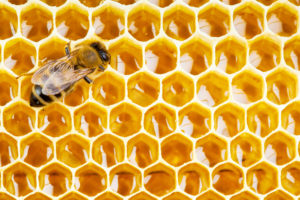Blog
Honeybees Benefit Tennessee Agriculture
Honeybees pollinate numerous crops. In Tennessee the value of crops benefiting from their pollination exceeds $119 million annually. Unfortunately, diseases and pests have caused annual losses of bees, in some years as many as 50%.
We are pleased to be telling you that Buckhorn Inn is doing its part to protect and support these important pollinators. Thanks to our son Jack, two new hives have been put up and two colonies of bees installed. Queen Bee Elizabeth and her minions are on the left, while Queen Bee Victoria has her kingdom in the hive on the right. Our immediate goal is to increase the population of honeybees. But ultimately we hope to produce enough delicious honey to supply the Buckhorn Inn kitchen and to offer some to guests. We thought you might want to learn about honey bees along with us!
Facts about Honeybees
- 1. Honeybees have six legs, two compound eyes, three simple eyes, two pairs of wings, a nectar pouch, and a stomach. http://www.benefits-of-honey.com
- 2. Honeybees can fly as fast as 15 miles per hour and can travel as far as six miles. Their wings beat about 200 strokes per second.
- 3. In order to collect one kilogram of honey, a hive of bees will fly the equivalent of three orbits around the earth.
- 4. The queen bee can live up to five years. Her colony consists of 20,000 to 60,000 bees.
- A forager bee visits 50 to 100 flowers on each flight from the hive. She repeats these trips all day, averaging as many as 2,000 flowers per day.
- It takes six to eight pounds of honey ingested for bees to produce one pound of beeswax.
- The only bees that sting are the worker bees. They will only sting if they feel threatened, and will die once they sting.
- In the lifetime of a worker bee, she produces about 1/12th teaspoon of honey.
- Bees overwinter by clustering in their hives to keep the queen and themselves warm. They feed on the honey collected during warmer months and on syrup provided by the beekeeper.
- Forager bees find flowers then return to the hive and share detailed directions. In 1973 Karl von Frisch received the Nobel Prize in Medicine for cracking the code of the bees–the waggle dance.
Watch our blog and Facebook and Instagram posts for more information about our bees. We are proud members of the beekeeping associations of Sevier County and Tennessee. You may visit http://www.tnbeekeepers.org for information on the resources they offer.






Gatlinburg Weather
Click for weather forecast